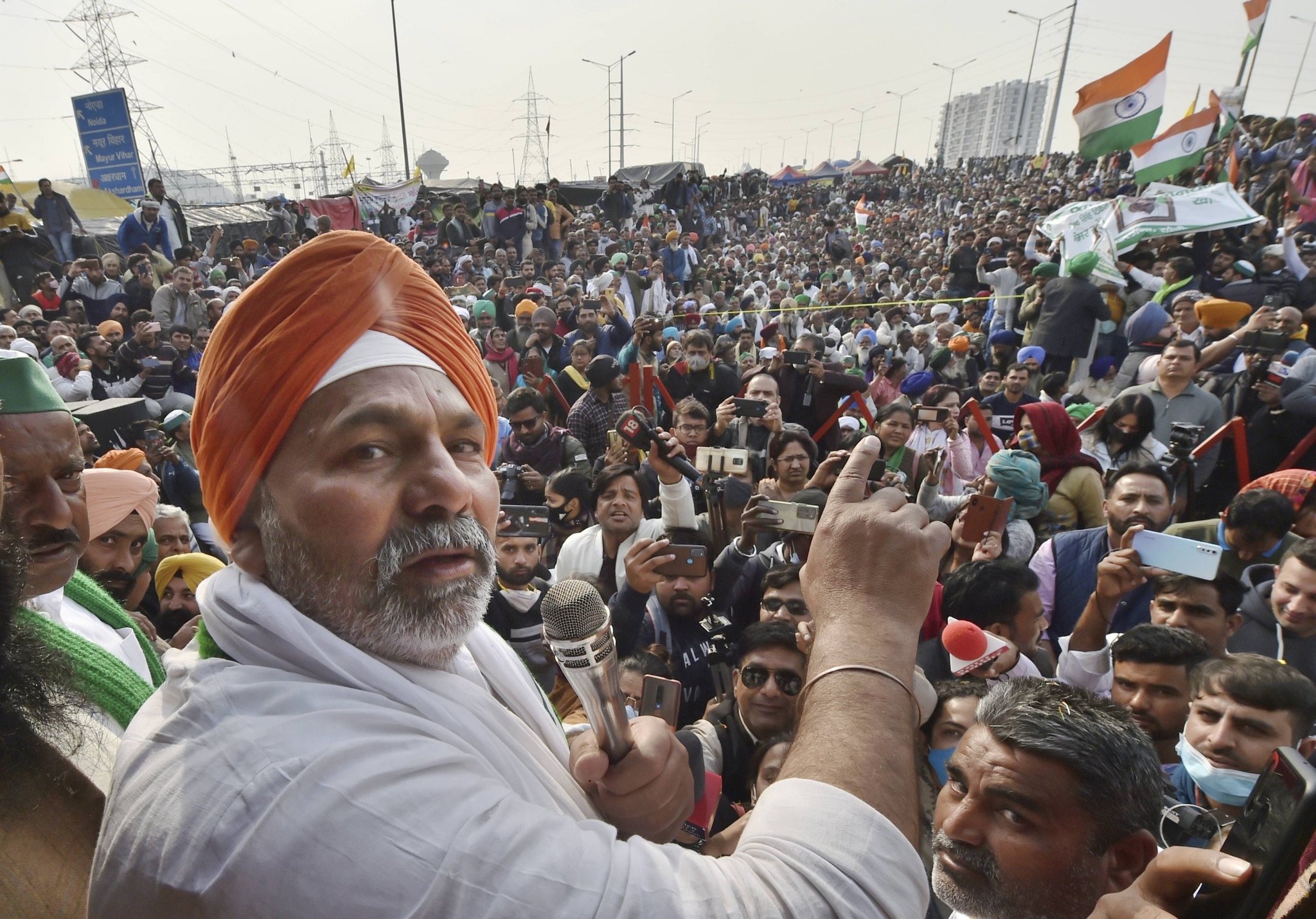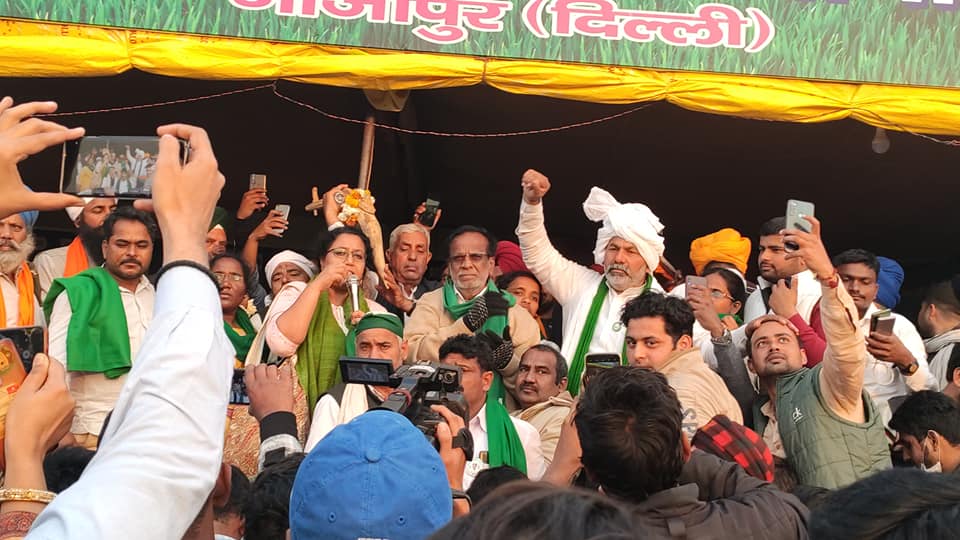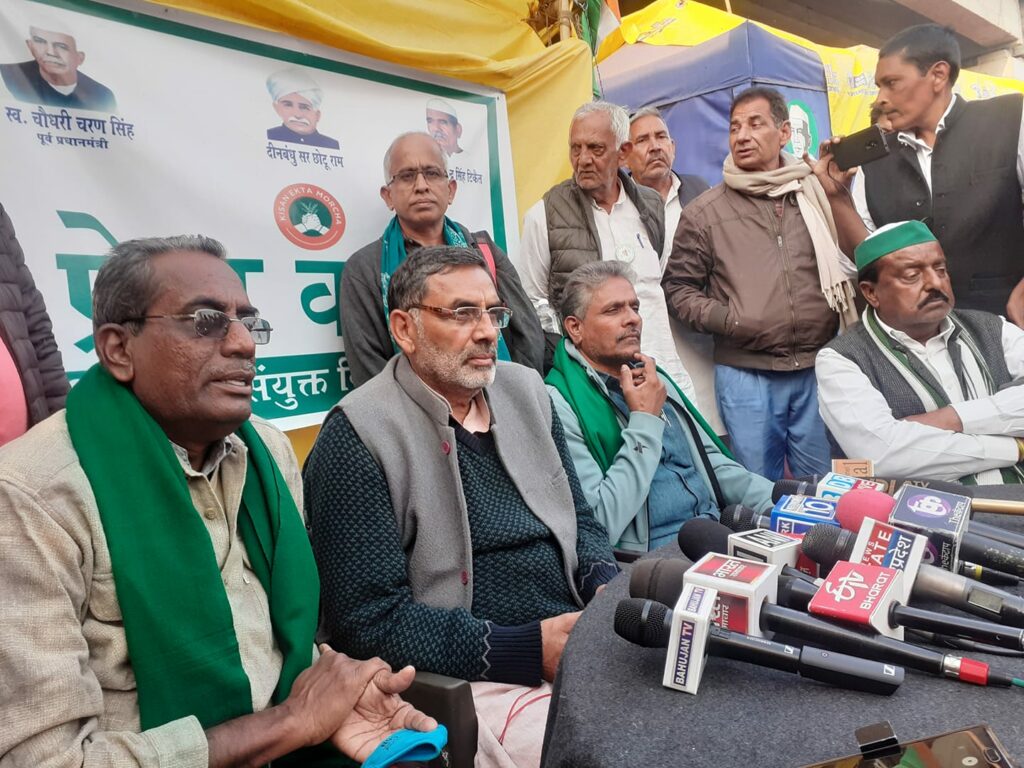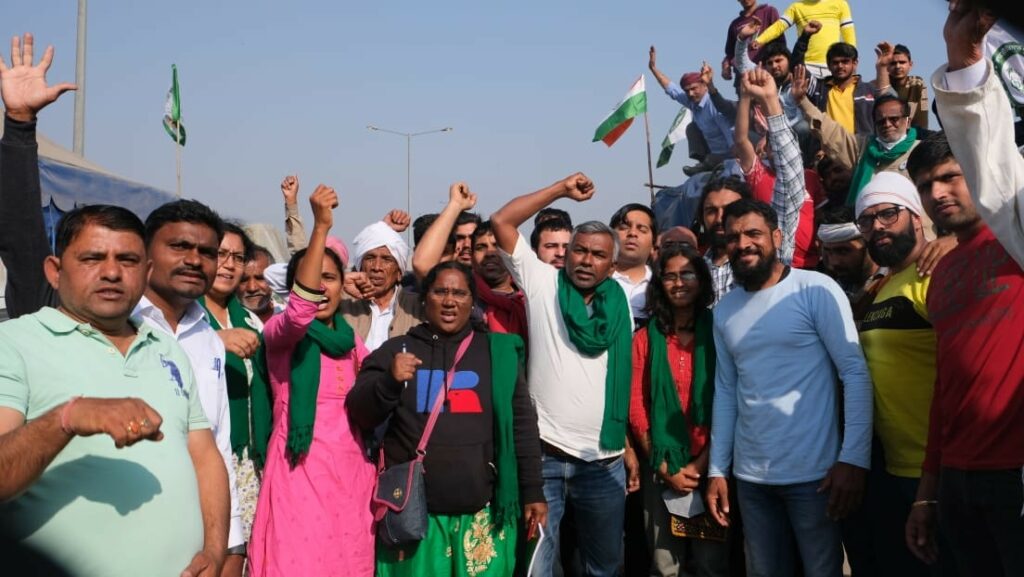Highlights:
1. India’s Farmers’ Movement has gathered steam since 26th January tractor parade, with at least eight Mahapanchayats (gathering of Village councils) so far in different parts of Haryana and UP, each boasting of over 20,000 participation.
2. Prime Minister has appealed to the farmers to resume dialogue, but farmers’ insist that it is for the government to set the dates and call them.
3. Prime Minister, on the Parliament floor, has given a verbal assurance that Minimum Support Price is here to stay. Farmers, however, repeated their demand for a ‘legal guarantee’ that purchases, under any circumstances, will only happen at or above the MSP rate.
4. The coalition of Unions have announced their readiness to stay on till October 02nd, Mahatma Gandhi’s birth anniversary, and that the movement will remain peaceful, as it has been so far. “If they plant nails on the road, we will plant flowers”, adds Rakesh Tikait.
5. The protesting movements have also warned the Opposition political parties not to co-opt their struggle. Solidarity is welcome, but this is a movement of farmers, led by farmers, the unions say.
6. Farmers unions in Southern states pledge to move their protests to Delhi, as mainstream electronic media allegedly ignores mobilizations in State capitals and district centres.
7. Solidarity has also flown in from International Community and UN Human Rights Council has also appealed all parties involved to maintain peace and respect for human rights.
8. The support for the protest, particularly from the youth and women have grown considerably over the last few weeks, with protest site teeming with community kitchens, art and cultural shows.
9. Farmers’ Unions are putting together a plan for a nation-wide tractor parade in the coming weeks
10. Crackdown on social media accounts, independent news outlets and journalists covering the issue have only galvanized the support further, with community-based reporters stepping in to keep the news flowing from protest sites.
More than seventy-five days after they first camped around the borders of New Delhi, India’s farmers continue with their demands to repeal three controversial laws that could corporatize the country’s agricultural sector. Despite the challenges, the movement has only grown in strength and stature.
“We are here for the long haul”, says Rakesh Tikait of the Bhartiya Kisan Union (BKU). On the evening of January 28th, his emotional appeal had galvanized the rural communities like never before. “We are willing to sit here as long as it takes. But unless the government repeals the three laws, we are not going home.” Since January 26th, when farmers took out a massive tractor parade in New Delhi to mark the country’s Republic Day, the movement has only grown in strength. Mahapanchayats held in neighbouring districts of Delhi have drawn thousands of people, reflecting the growing support the protest is gaining among the affected communities.
“This is an unprecedented level of mobilization. The last we witnessed such crowds on the streets was when Chaudhary Mahendra Singh Tikait mobilized farmers in the late 80s.”, says Dharmendra Malik of BKU, recalling the legendary peasant leader who is also the founding member of his union.
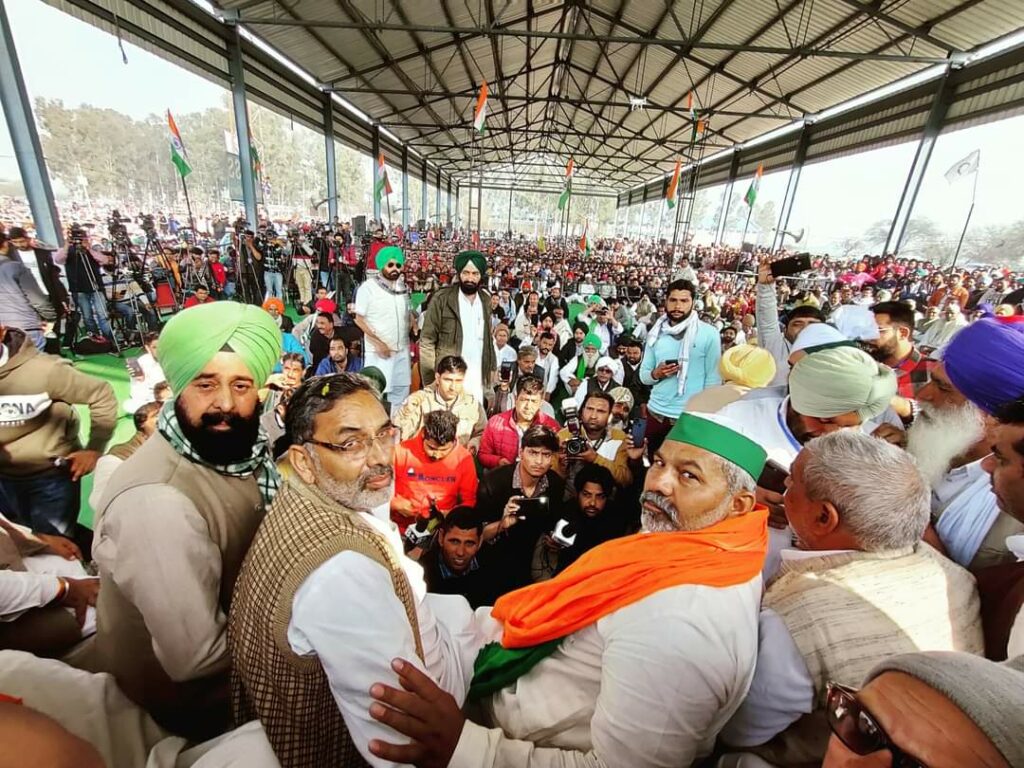
“Over the last two decades, many had suspected that the farmers’ movements in India had fragmented too much. But this time, it is clear that farmers across religious, caste and geographical lines have come together to express their demands. With each passing day, the movement is only gaining strength despite attempts to silence us. Internet shutdowns and other tactics are not working, as the anger on the ground are real.” Malik adds.
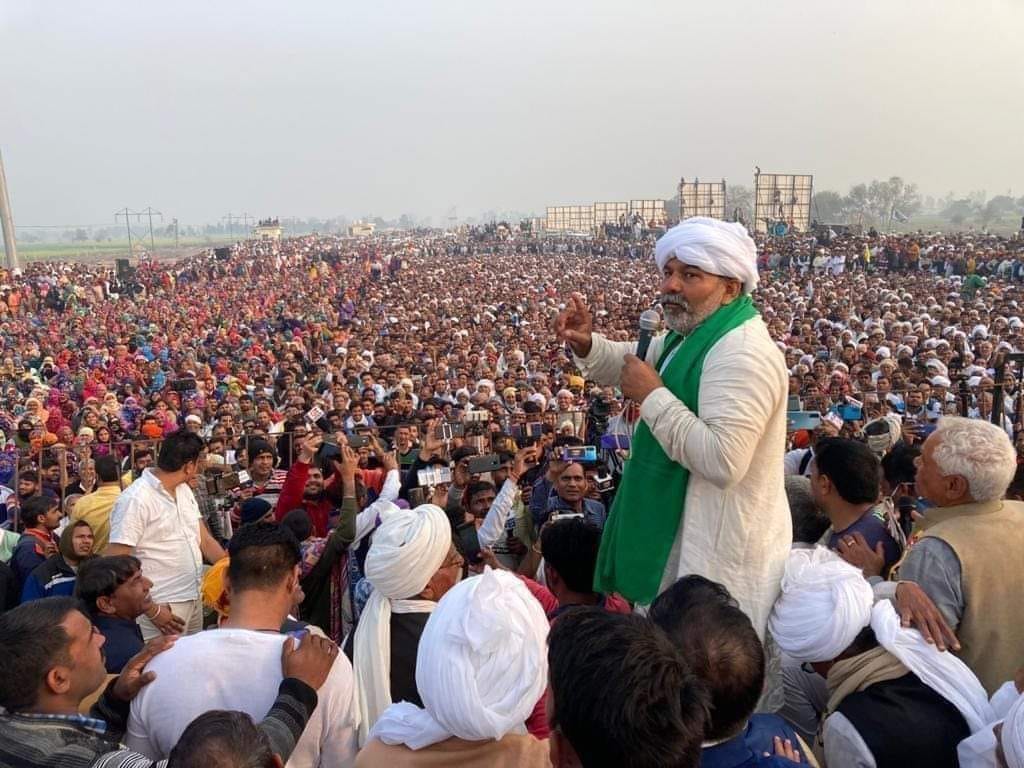
The ruling government’s recent attempt to restrict Internet access at sites of protests and build concrete and barbed wire fences along major arterial roads had caused a considerable uproar.
On the night of January 26th, dramatic scenes had unfolded at the Gazipur border when Tikait accused that hired goons were waiting to pounce on peaceful protestors. While speaking to reporters that night, he broke down, clearly upset at efforts to brand protesters as traitors and terrorists. “We are people who feed this country. We work on the fields under hostile weather conditions, and our children guard the country’s border from hostile nations. How dare anyone question our patriotism and commitment to this nation?” he asks.
The Samyuka Kisan Morcha, a coalition of over 40 farmers unions, which leads and speaks on behalf of the protesters believe that dialogue is the only way to resolve this matter. Criminalizing farmers and directing hate campaigns against them will only make matters worse, they believe.
“The Prime Minister has said that he is just a phone call away. Well, we are waiting to get that phone number so we can make that progress. At the floor of the Parliament, he said that the Minimum Support Price is here to stay. However, we need a legal guarantee that no trader will ever purchase our produce below this price under no circumstances. If the idea is to help farmers, and improve their income, then why is there a reluctance to bring a law guaranteeing MSP?”, asks Yudhvir Singh of Bhartiya Kisan Union.
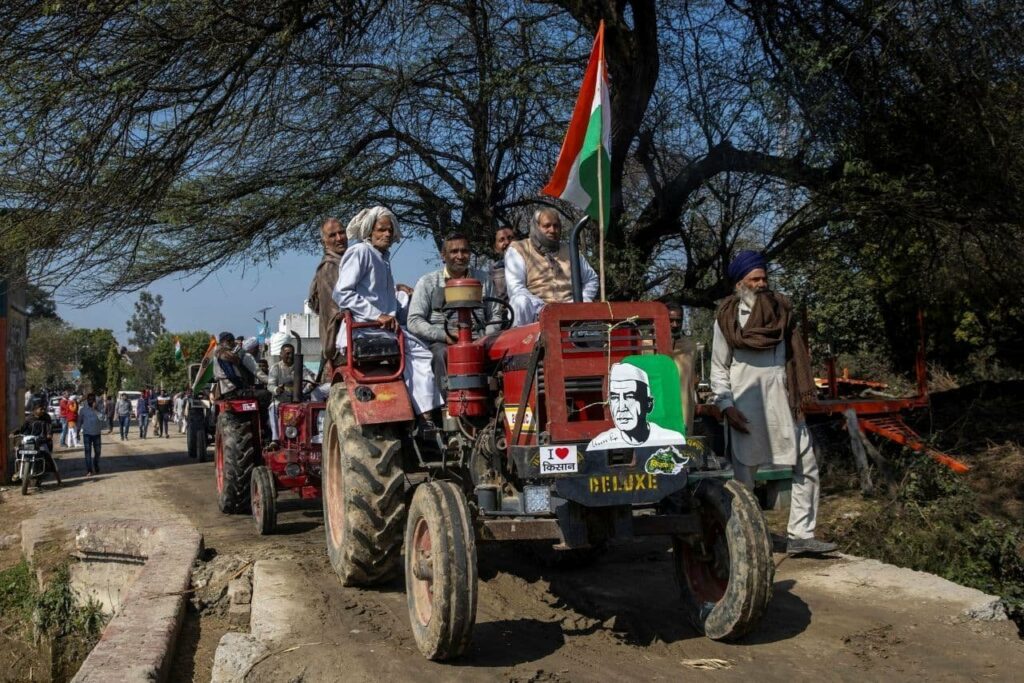
Yudhvir Singh and Rakesh Tikait are among the leaders who are members of the Samyuka Kisan Morcha. “We take collective decisions in the coalition. We stay united, and any news that tells you otherwise is a lie”, adds Rakesh.
Over the last ten days, farmer leaders from Karnataka, Tamil Nadu, Maharashtra and Kerala have also visited the border sites and extended solidarity to the protesters.
“It is wrong to say that only North India’s farmers are protesting. In Bangalore, Coimbatore, Telengana, Chattisgarh, Jharkhand protests have been on for many months. The mainstream electronic media barely covers it. That is why farmers are now using our own Facebook pages, and Twitter handles to reveal our side of the story. The crowds that each council meeting draws prove that this movement is here to stay until they meet our demands. From Karnataka and Tamilnadu thousands more will reach Delhi in the coming weeks. We will expose this conspiracy to paint this whole protest as only led by farmers of Punjab. Just a few days ago, even the Odisha government spelt out their stand in support of our demands. Why do you think this is happening?”, asks Chukki Nanjudaswamy of Karnataka Rajya Raitha Sangha.
“It is perhaps the largest mobilization in recent history. Ours is a country of nearly 1.4 billion people. Over half of the population have their livelihoods tied to agriculture and allied activities. In places such as the US, Canada and Europe, corporate take over agriculture has led to peasants’ marginalization. In those countries, peasant communities have lost autonomy over seeds. A few agribusiness giants control the entire food chain. If that is path India wants to take, where will our peasants go? What will these 500 million people do? For a country like India, decentralized collective farming through farmers’ cooperatives makes more sense. The Prime Minister’s appeal to be “Vocal for Local” has to translate into real actions on the ground. It would mean, to begin with, providing a policy framework that encourages agroecological production. It would mean promoting producer cooperatives, raise public investment in rural infrastructure. It would mean advancing public research on peasant agroecology and developing a producer-consumer chain that first caters to local demands. Farmers are clear about what they want. Hence any law that directly impacts us has to be brought in after taking our inputs.” Chukki adds.
The protesting farmers’ unions have issued a call to organize a nation-wide tractor parade very soon. They have also chalked out a strategy to move farmers from villages to Delhi borders in batches, to ensure that the work back home doesn’t stop. “We will ensure that food production doesn’t stop. But we will also ensure that the movement remains strong. We have made plans to stay on until October 02nd, the birth anniversary of Mahatma Gandhi.”, says Rakesh Tikait.
Dharmendra Malik points to the swelling support among the youth. “We are overwhelmed by the support of the youth. When the administration blocked water supply to the site, they brought water from our villages. We are proud that peasant women and the elders are resilient and committed to staying on despite the difficult conditions. Across caste and religious lines, people have united. This unity that is on display must remain intact. All of us need to be alert to the attempts to divide the movement”
“Attempts to intimidate journalists covering the protests, and raiding some of the independent news outlets who have been covering our side of the story will backfire. Criminalizing farmers and journalists will not help in an early resolution. Ours is a democracy, one of the world’s largest. It is a country with a rich history of peoples’ movements, and any attempt to intimidate has only backfired so far.” he says
The United Nations Human Rights Council had also issued a statement seeking all parties involved to exercise maximum restraint and find equitable solutions that show respect for human rights. In a move to seek protection and security from detention and arrests, farmers’ unions have written to the United Nations Human Rights Council (UNHRC). The five-page plea further details the extent of their plight due to the suspension of internet services in the protest sites. The requests spelt out in the letter include medical check-up for those in detention, family members’ information, identification of the interrogation officers and a memo of arrests. According to a media report, at least 21 farmers are missing since the Delhi tractor parade, and their whereabouts have been unknown since the clash.
“Our appeal to the government is to pay heed to the pulse of the people, listen to our voices and give what we need. Reforms in the agriculture sector are necessary, as long as they are in the interest of farmers. And to ensure that, you have to bring reforms after consulting the people who will be impacted by it. Right now, we see a bunch of laws that speak for the benefit of the traders, particularly the big corporate houses. And they were brought in without consulting us.” Malik adds.

